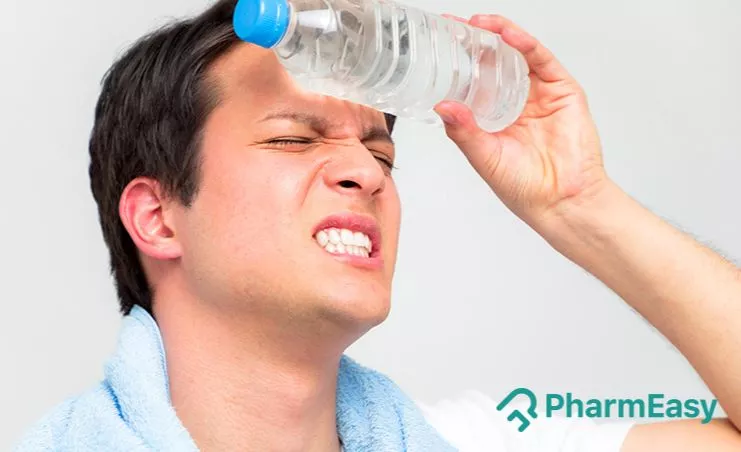Hyperthermia- Its Symptoms And How To Address It
By Dr. Nikita Toshi +2 more

Get,

to manage your symptom
Get your,


4 Cr+ families
benefitted

OTP sent to 9988776655



You’ve successfully subscribed to receive
doctor-approved tips on
Whatsapp

Get ready to feel your best.

Hi There,
Download the PharmEasy App now!!


Register to Avail the Offer
Send OTPBy continuing, you agree with our Privacy Policy and Terms and Conditions

Hi There,
Sign up on PharmEasy now!!
Trusted by 4 crore+ families

OTP sent to 9988776655



You have unlocked 25% off on medicines




Code: NU25
By Dr. Nikita Toshi +2 more
Table of Contents
Hyperthermia is generally characterised by an unusually high body temperature. It is an illness caused by increased temperatures. There are various forms of Hyperthermia. It transpires among people living in humid tropical conditions. When one’s body is unable to release the amount of heat it absorbs from the environment, Hyperthermia occurs. This can also be caused due to overexertion in hot temperatures. It is not the same as acquiring a fever. This can cause damage, however, it is also preventable. Read on to find out about Hyperthermia, its types, symptoms and aid!

Muscle cramping can occur due to the loss of electrolytes in your bodily fluids. High temperatures can lead to excessive sweating and drainage of salt and necessary fluids from your body. Heat cramps can occur in your hands, legs or feet.
A more serious form of Hyperthermia is heat exhaustion. Here, you get exhausted. Your body temperature rises to 40 degrees Celsius or more and can even lead to heatstroke.
If you sweat above normal in the heat, you may develop a heat rash. It looks like a collection of swollen red pimples or blisters. These can spread and usually develop in your arms, armpits, chest, neck and elbow region.
Hyperthermia can harm one’s mental health. People required to work in hot weather conditions can experience exhaustion and mental stress. Firefighters, coal miners, construction workers, etc are prone to heat stress.
Hyperthermia can develop into heatstroke. Heatstroke can be damaging to one’s health and can affect multiple organs of the body. Your body temperature rises above average and can leave you feeling disoriented, dizzy and nauseous.
Continuous application of cold water to the skin can be achieved by either sponging the patient or using a spray bottle. Placing a fan to blow directly on the patient while also spraying or sponging will increase the rate of evaporation, and thereby, will more rapidly decrease body temperature in hyperthermia.
Dr. M.G. Kartheeka, MBBS, MD(Pediatrics)
The definitive treatment for heat-related illness (hyperthermia) is total body cooling. Conduction and evaporation are the two modes of cooling commonly employed in the treatment of heat-related illnesses.
Dr. Ashish Bajaj, M.B.B.S., M.D. in Clinical Pharmacology and Toxicology
It is important to know who is most at risk of contracting Hyperthermia. Those working in dry or humid heat conditions are most likely to feel the symptoms of Hyperthermia. Construction workers, labourers, farmers or vendors selling wares in the open are at high risk. People with heart conditions or blood pressure issues may find it difficult to cool their bodies down because of their health conditions. Some also have a low-sodium diet which can trigger Hyperthermia. The elderly are also susceptible to such excessive conditions because of their age. Younger children who play in the sun can also experience the fatal blow of Hyperthermia. Some tips to prevent such excessive conditions include:
Infants and children up to four years of age, people 65 years of age and older, people who are overweight, and people who are ill or on certain medications are usually at greater risk for hyperthermia.
Dr. Ashish Bajaj, M.B.B.S., M.D. in Clinical Pharmacology and Toxicology
Call for medical assistance immediately after you notice any symptoms of Hyperthermia. While professional help is on the way, stop any physical activity and rest in a shaded area. Remove excessive clothing and look for an ice pack or cool sponging to apply to your skin. Apply powder or any ointment to rashes or irritated skin. Try to gently stretch any cramped muscles.
Hyperthermia can be dangerous in such conditions. One must look out for oneself and others to be of better assistance in need of dire situations. It can prove to be life-threatening if not treated properly.
Disclaimer: The information provided here is for educational/awareness purposes only and is not intended to be a substitute for medical treatment by a healthcare professional and should not be relied upon to diagnose or treat any medical condition. The reader should consult a registered medical practitioner to determine the appropriateness of the information and before consuming any medication. PharmEasy does not provide any guarantee or warranty (express or implied) regarding the accuracy, adequacy, completeness, legality, reliability or usefulness of the information; and disclaims any liability arising thereof.
Links and product recommendations in the information provided here are advertisements of third-party products available on the website. PharmEasy does not make any representation on the accuracy or suitability of such products/services. Advertisements do not influence the editorial decisions or content. The information in this blog is subject to change without notice. The authors and administrators reserve the right to modify, add, or remove content without notification. It is your responsibility to review this disclaimer regularly for any changes.

Leave your comment...
Comments